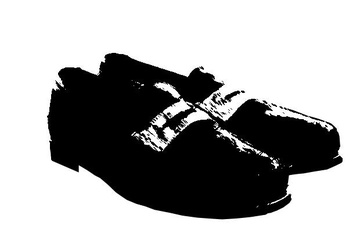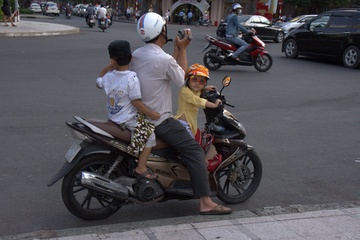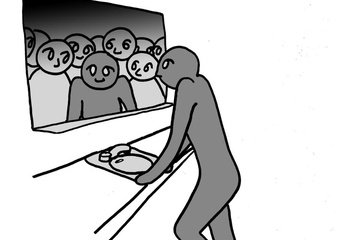My mom always had a dad, though I never really had a grandfather. A $25 check for Christmas, one for my birthday as well. The sentimental card that used to arrive around Valentine’s Day. For someone special always gave me pause.
We would visit every few years—he had houses in Ohio and Florida. Fish and guests are a lot alike, you know? Both of them start to smell after three days. We would often stay longer.
Our meals would be eaten at his favorite restaurants, at night they were followed by drinks at the bar. The waitresses knew his name. Oh, Bill, then a high laugh that I was too young to decipher. He would produce a flower plucked from some nearby planter—another laugh. Now what can I get you guys for breakfast? I remember the way he always ordered extra bacon.
Then, the obligatory driving tour of the neighborhood. He would point out what had changed since our last visit. I could rarely remember enough to appreciate the suburban alterations. I sat in the back. He insisted upon radio talk shows, despite the inaudible volume. Once, in the parking lot, he gave me my first gold necklace. My mother smiled by the passenger side door and I wondered if this meant something I was missing.
When we returned to his house, he would go to the basement, turn on the television. Was there cheap vodka? The muffled volume provided the soundtrack to the shows my mother and I watched, on low, the floor above. Once, I decided to perform a ballet for her—in between segments of “American Idol,” I found inspiration in stocking feet on plush carpet. Steps on the stairs. Can you stop all that banging around? I can’t hear my program. I told Mom I couldn’t see what the big deal was—we could hear his program just fine. Let’s just wait until tomorrow.
Sometimes, tomorrow meant the museum or the water park. Eventually, it would mean returning home. Air-conditioned drive, leather seats, terminal—I don’t really remember the coming and going. The in-between always comes easier to my mind.
When he got sick, my mom, aunt, and uncle moved their father to live near us in Western Massachusetts. I was already in college at the time. Conversations with my mother now centered on where they had gone for lunch that week, the most recent purchases at Target. We were walking down the street today and Dad just lost his pants. He was a good sport about it, though. We had to go and buy him new ones. In the past, her voice hadn’t been as gentle toward him. It also hadn’t seemed so tired.
When Christmas came, we were at my grandma’s, his former wife. She had given me their engagement ring years before. For graduation—I never take it off. He would die if I told you this but do you know that I bought that ring myself? He didn’t have the money at the time so I just marched us down to the store and picked it out. I’ve questioned the significance of constantly bearing an emblem of broken love.
When the light catches it, it casts prisms just the same.
In the living room, my aunt tried to strike up conversation. So Bill, isn’t it nice to be here with your family for Christmas? He would prefer Florida. He was happy that soon he’d be able to drive once more. I was angry. He hadn’t been the grandfather who slipped Oreos with a wink when my mom wasn’t watching. I had never been enamored by his stories as he recounted his past. My father’s parents had died before I met them—he was my only chance. I told him that he wasn’t being realistic, that he wouldn’t be able to return to his home. I told him that he should enjoy being with us.
Mom was not happy. That was not your place. What does it matter if we let him hope? I tried to feel remorse. All I could see were the lines around her eyes. If anything, I regretted adding more stress, making them more pronounced.
I didn’t expect to feel anything when I said goodbye. Mom promised we wouldn’t be at the hospital long. We’ll just stop in, he’ll be happy to see you here. A stroke the week before had rendered him unable to swallow. He was conscious but without food or drink. I looked away. Mom stepped out to find water for his lips.
I sat on stiff cushions; his body was tangled in the sheets. The man on the television referred to years by their presidents, even though the topic was not politics. Moans came from the bed, attempts at speech that were impossible to hear. I took my mother’s seat at his bedside. I held his hand.
I don’t know what you’re saying, I can’t understand. I struggled to find words sufficient to fill a gap of 19 years. I’m a sophomore now, almost a junior. Classes have been going really well. You would be proud of my grades. I write for a magazine, that’s where I spend most of my time. I’ve been writing a lot, actually—I wish I had some here. I’m going to Tanzania in June. What more did I have to say? Tears I thought would never come came.
Mom returned. I knew she was thankful for the past year, it had brought them closer together. She waited at the door until I ran out of words. When she entered, he had dropped my hand. I relinquished my chair.
Mom and I sat, watching television. Are you going to do something fun today? Are any of your friends around for Easter? I’ll stop at the grocery store on my way home. Is there anything you want me to pick up? I told her my plans—I probably wouldn’t be back that night but would make sure to come home early tomorrow. We made a shopping list. Are you sure you don’t want anything for breakfast? The 70s and 80s became the Carter Era and Reagan Administration. A stretcher came to bring him to a nursing home for the final few days. Okay Dad, they’re here. Are you ready? The nurses had loved my grandfather, even though he no longer had flowers to give.
—Kathryn C. Reed ’13 is a sociology concentrator in Adams House.





